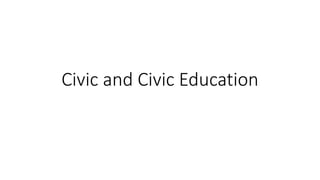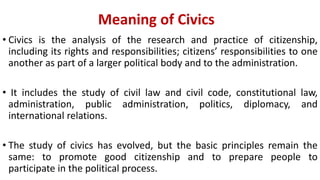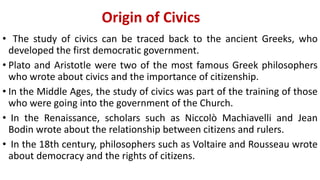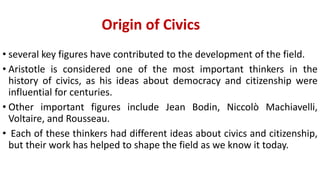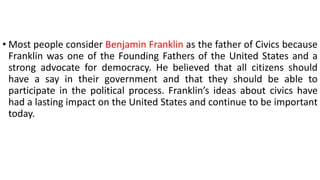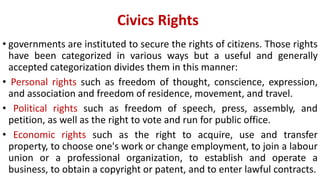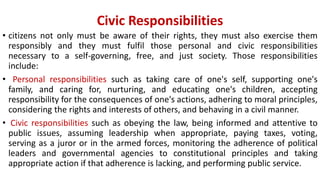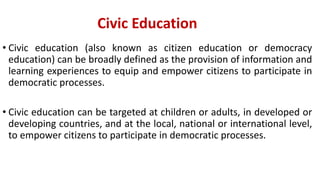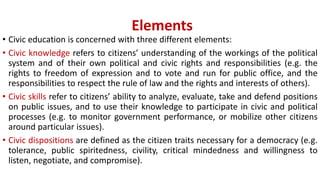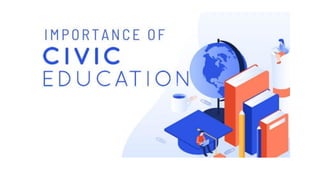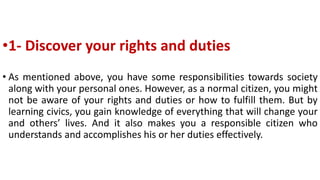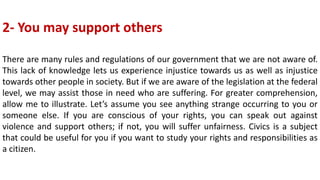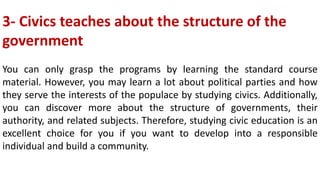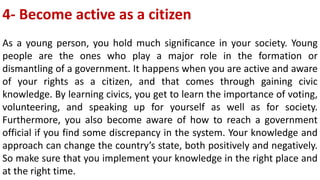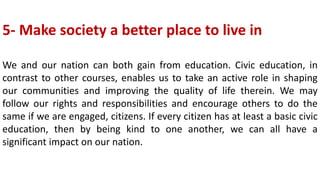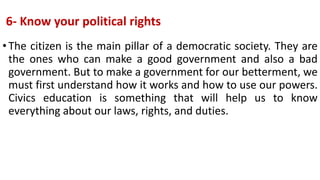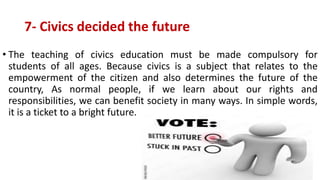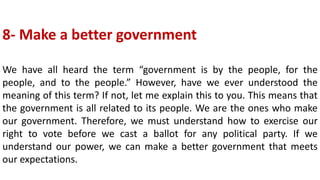Civic and Civic Education L1-1.pdf for mechanical engineering
- 1. Civic and Civic Education
- 2. Meaning of Civics • Civics is the analysis of the research and practice of citizenship, including its rights and responsibilities; citizens’ responsibilities to one another as part of a larger political body and to the administration. • It includes the study of civil law and civil code, constitutional law, administration, public administration, politics, diplomacy, and international relations. • The study of civics has evolved, but the basic principles remain the same: to promote good citizenship and to prepare people to participate in the political process.
- 3. Origin of Civics • The study of civics can be traced back to the ancient Greeks, who developed the first democratic government. • Plato and Aristotle were two of the most famous Greek philosophers who wrote about civics and the importance of citizenship. • In the Middle Ages, the study of civics was part of the training of those who were going into the government of the Church. • In the Renaissance, scholars such as Niccolò Machiavelli and Jean Bodin wrote about the relationship between citizens and rulers. • In the 18th century, philosophers such as Voltaire and Rousseau wrote about democracy and the rights of citizens.
- 4. Origin of Civics • several key figures have contributed to the development of the field. • Aristotle is considered one of the most important thinkers in the history of civics, as his ideas about democracy and citizenship were influential for centuries. • Other important figures include Jean Bodin, Niccolò Machiavelli, Voltaire, and Rousseau. • Each of these thinkers had different ideas about civics and citizenship, but their work has helped to shape the field as we know it today.
- 5. • Most people consider Benjamin Franklin as the father of Civics because Franklin was one of the Founding Fathers of the United States and a strong advocate for democracy. He believed that all citizens should have a say in their government and that they should be able to participate in the political process. Franklin’s ideas about civics have had a lasting impact on the United States and continue to be important today.
- 6. Civics Rights • governments are instituted to secure the rights of citizens. Those rights have been categorized in various ways but a useful and generally accepted categorization divides them in this manner: • Personal rights such as freedom of thought, conscience, expression, and association and freedom of residence, movement, and travel. • Political rights such as freedom of speech, press, assembly, and petition, as well as the right to vote and run for public office. • Economic rights such as the right to acquire, use and transfer property, to choose one's work or change employment, to join a labour union or a professional organization, to establish and operate a business, to obtain a copyright or patent, and to enter lawful contracts.
- 7. Civic Responsibilities • citizens not only must be aware of their rights, they must also exercise them responsibly and they must fulfil those personal and civic responsibilities necessary to a self-governing, free, and just society. Those responsibilities include: • Personal responsibilities such as taking care of one's self, supporting one's family, and caring for, nurturing, and educating one's children, accepting responsibility for the consequences of one's actions, adhering to moral principles, considering the rights and interests of others, and behaving in a civil manner. • Civic responsibilities such as obeying the law, being informed and attentive to public issues, assuming leadership when appropriate, paying taxes, voting, serving as a juror or in the armed forces, monitoring the adherence of political leaders and governmental agencies to constitutional principles and taking appropriate action if that adherence is lacking, and performing public service.
- 8. Civic Education • Civic education (also known as citizen education or democracy education) can be broadly defined as the provision of information and learning experiences to equip and empower citizens to participate in democratic processes. • Civic education can be targeted at children or adults, in developed or developing countries, and at the local, national or international level, to empower citizens to participate in democratic processes.
- 9. Elements • Civic education is concerned with three different elements: • Civic knowledge refers to citizens’ understanding of the workings of the political system and of their own political and civic rights and responsibilities (e.g. the rights to freedom of expression and to vote and run for public office, and the responsibilities to respect the rule of law and the rights and interests of others). • Civic skills refer to citizens’ ability to analyze, evaluate, take and defend positions on public issues, and to use their knowledge to participate in civic and political processes (e.g. to monitor government performance, or mobilize other citizens around particular issues). • Civic dispositions are defined as the citizen traits necessary for a democracy (e.g. tolerance, public spiritedness, civility, critical mindedness and willingness to listen, negotiate, and compromise).
- 11. •1- Discover your rights and duties • As mentioned above, you have some responsibilities towards society along with your personal ones. However, as a normal citizen, you might not be aware of your rights and duties or how to fulfill them. But by learning civics, you gain knowledge of everything that will change your and others’ lives. And it also makes you a responsible citizen who understands and accomplishes his or her duties effectively.
- 12. 2- You may support others There are many rules and regulations of our government that we are not aware of. This lack of knowledge lets us experience injustice towards us as well as injustice towards other people in society. But if we are aware of the legislation at the federal level, we may assist those in need who are suffering. For greater comprehension, allow me to illustrate. Let’s assume you see anything strange occurring to you or someone else. If you are conscious of your rights, you can speak out against violence and support others; if not, you will suffer unfairness. Civics is a subject that could be useful for you if you want to study your rights and responsibilities as a citizen.
- 13. 3- Civics teaches about the structure of the government You can only grasp the programs by learning the standard course material. However, you may learn a lot about political parties and how they serve the interests of the populace by studying civics. Additionally, you can discover more about the structure of governments, their authority, and related subjects. Therefore, studying civic education is an excellent choice for you if you want to develop into a responsible individual and build a community.
- 14. 4- Become active as a citizen As a young person, you hold much significance in your society. Young people are the ones who play a major role in the formation or dismantling of a government. It happens when you are active and aware of your rights as a citizen, and that comes through gaining civic knowledge. By learning civics, you get to learn the importance of voting, volunteering, and speaking up for yourself as well as for society. Furthermore, you also become aware of how to reach a government official if you find some discrepancy in the system. Your knowledge and approach can change the country’s state, both positively and negatively. So make sure that you implement your knowledge in the right place and at the right time.
- 15. 5- Make society a better place to live in We and our nation can both gain from education. Civic education, in contrast to other courses, enables us to take an active role in shaping our communities and improving the quality of life therein. We may follow our rights and responsibilities and encourage others to do the same if we are engaged, citizens. If every citizen has at least a basic civic education, then by being kind to one another, we can all have a significant impact on our nation.
- 16. 6- Know your political rights •The citizen is the main pillar of a democratic society. They are the ones who can make a good government and also a bad government. But to make a government for our betterment, we must first understand how it works and how to use our powers. Civics education is something that will help us to know everything about our laws, rights, and duties.
- 17. 7- Civics decided the future • The teaching of civics education must be made compulsory for students of all ages. Because civics is a subject that relates to the empowerment of the citizen and also determines the future of the country, As normal people, if we learn about our rights and responsibilities, we can benefit society in many ways. In simple words, it is a ticket to a bright future.
- 18. 8- Make a better government We have all heard the term “government is by the people, for the people, and to the people.” However, have we ever understood the meaning of this term? If not, let me explain this to you. This means that the government is all related to its people. We are the ones who make our government. Therefore, we must understand how to exercise our right to vote before we cast a ballot for any political party. If we understand our power, we can make a better government that meets our expectations.
